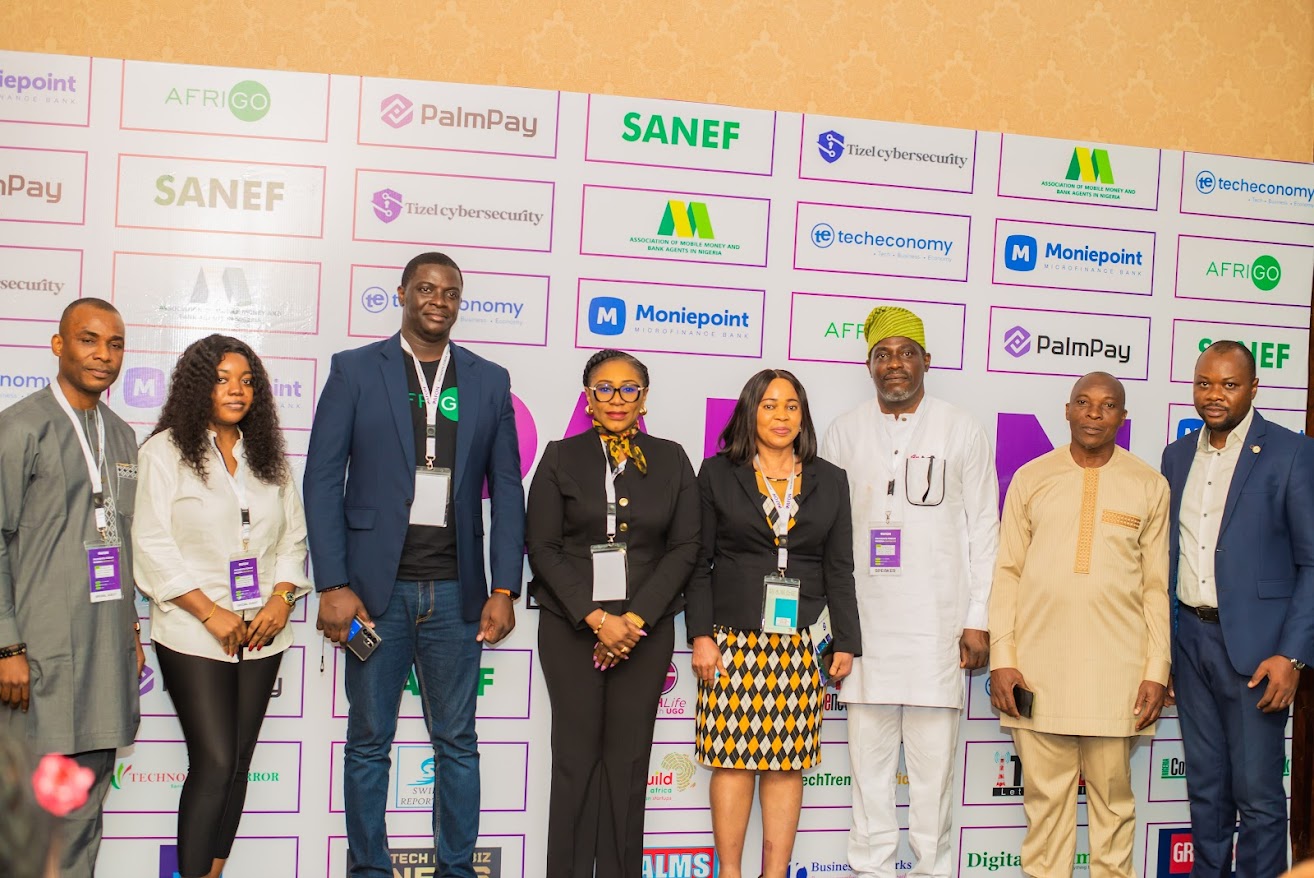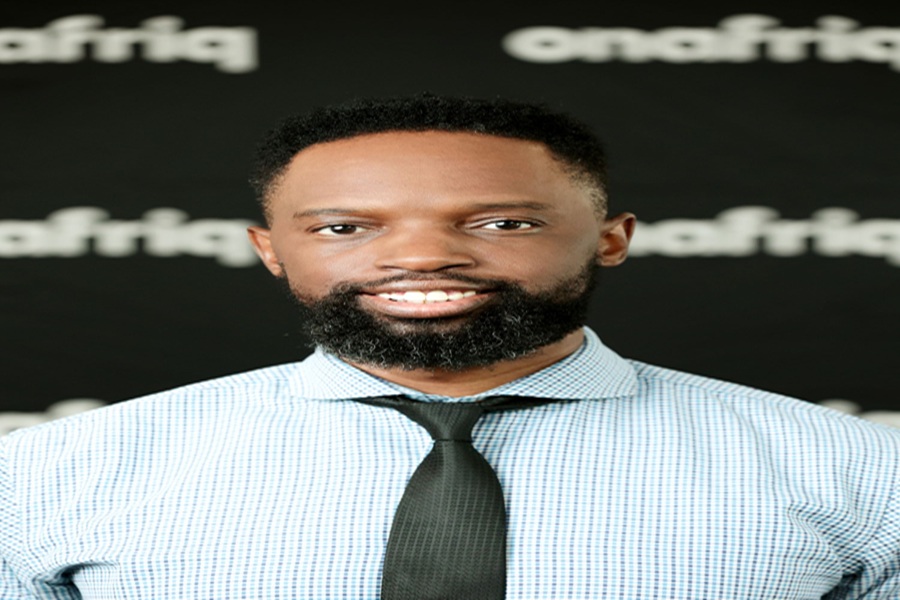Telecom
PAFON 2.0: Experts Discuss Pathways to Boost Financial Inclusion in Nigeria

Improved efforts at collaboration among financial service providers, telecommunication operators, and tech Startups, with conscious effort geared at consumer awareness, have been proffered as key remedies to the challenge of financial inclusion in the country.

L-r: Chika Nwosu, managing director of PalmPay; Oluwabunmi Ogunyemi, customer support lead at Moniepoint MFB; Munachi Duru, Head of Innovation and partnership at AfriGoPay Financial Services Limited; Mrs. Uche Uzoebo, MD/CEO, Shared Agent Network Expansion Facilities Limited (SANEF) Limited; Happiness Ohioha, CEO, Tizel Cybersecurity; Ibirogba Oluwagunwa, chairman, Lagos State Chapter of the Association of Mobile Money & Bank Agents in Nigeria (AMMBAN); Chike Onwuegbuchi and Peter Oluka, co-conveners, Payments Forum Nigeria (PAFON), at PAFON 2.0 held in Lagos, recently.
This is the viewpoint of stakeholders that gathered for the second edition of Payment Forum Nigeria (PAFON 2.0) held recently in Lagos.
Delivering a keynote address on the theme, “Bridging the Customer Experience Gap for Financial Inclusion Using AI”, Ebehijie Momoh (Mrs.), the managing director and chief executive officer of AfriGoPay Financial Services Limited, said that with 64% of Nigerian adults being financial included the country has made immense progress in that regards.
She said that between 2012 till date, the country has recorded robust regulatory reforms, especially the launch of the Bank Verification Number (BVN) in 2014 making it easier to identify and track customers across different banks.
“This initiative enhanced the credibility of the financial sector and increased confidence in formal banking systems.
The growth in adoption of smartphones has also helped the financial sector to leapfrog financial inclusion. Nigeria has 142.16 mobile internet subscriptions with an average consumption of ~7.04GB / month as of January 2025. If you juxtapose it to the 15.9% decline in shipments of feature phones to 18.8 million units in Africa as at Q1 2024, you will understand that the uptake in smartphones has helped us a great deal.
Mrs. Momoh who spoke through Mr. Munachi Duru, the head of Innovation and Strategic Partnership at AfriGoPay, said the adoption of artificial intelligence banking gave birth to solutions like smile identity, a leading KYC verification provider launches facial recognition capabilities in Nigeria as neobanks and commercial banks are deploying AI-based KYC verification tools, enabling cheaper and efficient customer acquisition and servicing.
In her goodwill message, Mrs. Uche Uzoebo, MD/CEO, Shared Agent Network Expansion Facilities Limited (SANEF) Limited said that with progress made in accelerating financial inclusion to unbanked and underbanked communities in Nigeria, SANEF has leveraged Artificial Intelligence (AI) as the next step to advancement in financial services in the country.
She noted that as technology evolves rapidly within the financial ecosystem, Financial Inclusion must continue to be at the center of the nation’s progress.
According to her, agent banking has been a game-changer in expanding financial inclusion across Nigeria. “By deploying agents in underserved areas, we have brought financial services and banking products such as account opening, cash in, cash out, bill payment, transfers and other services closer to the unbanked and underserved.”
Speaking during a panel session, Mr. Ibirogba Oluwagunwa, chairman, Lagos State Chapter of the Association of Mobile Money & Bank Agents in Nigeria (AMMBAN), spoke of lack of collaboration and slow institutional drive towards AI as key barriers hindering digital inclusion.
He harped on the need for information sharing among fintech operators, and improved free flow of information to consumers. “The human barrier angle needs to be addressed. Fintechs need to be pushed to move forward, AI cannot operate itself.”
In his contribution, Mr. Chika Nwosu, managing director of PalmPay, reiterated the need to reach the consumers with simple format communication and education style.
He said operators should create awareness and design consumer–centric approach in developing any products. This will not only draw the consumers towards the product, but also generate trust and ease the use of such products.
Focusing on the use of AI to ensure reach, inclusion and security, Azure Application and AI Specialist at Microsoft UK, Olusoji Solomon Adeyemo, spoke on the need for AI and Blockchain in the bid to extend services to rural communities and the unbanked.
According to him, “AI, Blockchain and CBDs are shaping the future of payment, and there is a serious need for education. We need to align with global trends in new tech adoption.”
While noting that AI can ensure reach, Adeyomo said blockchain will also create digital identity that is exclusive and will promote digital financial inclusion.
In her position, Oluwabunmi Ogunyemi, the customer support lead at Moniepoint MFB, proffered physical and digital meet with customers, even in rural areas, as a viable means of inclusivity.
Also speaking, Olusegun Afolabi, the co-founder of Face Technologies UK Ltd., called for improved collaborations among stakeholders in the financial sector.
According to him, the fintech companies must also embrace effective identification solutions, focusing on biometrics and card technologies to ensure topnotch security for users.
Earlier in his opening remarks, Mr. Peter Oluka, co-Convener of the Forum, noted that the financial inclusion journey in the country has come to a crucial juncture where over 30 million adults are still financially excluded, many of whom reside in rural areas or belong to vulnerable demographics.
He noted that despite 12% growth in access to formal financial services between 2020 and 2023, as recorded by the EFInA Access to Financial Services Survey 2023, challenges still exist that hinders the unlocking of the potentials of digital payments to drive inclusive growth in Nigeria.
He further posited: “As digital infrastructure grows and fintech innovation accelerates, we must channel these advancements toward building a more inclusive, secure, and trusted financial ecosystem. This is not just about transactions — it’s about empowerment, opportunity, and economic participation for all.
Nodding in agreement, Mr. Chike Onwuegbuchi, co-Convener, PAFON, reiterated the need for all stakeholders in the financial payment industry, including regulators, to participate in forums as PAFON, to map out, growth strategies with consumers and other strata of the ecosystem.
He promised to invite security stakeholders, such as the EFCC and others in subsequent editions of the event. This will help give insight into security concerns in deployment of products and services in rural and unbanked communities.
Payments Forum Nigeria (PAFON) is a platform dedicated to shaping the future of digital payments and financial services in our country.
Telecom
MoMo PSB, SMEDAN Forge Pact to Digitise Nigeria’s SMEs

MoMo PSB, MTN Nigeria’s fintech powerhouse, sealed a game-changing pact with the Small and Medium Enterprises Development Agency of Nigeria (SMEDAN) on February 3 at its Victoria Island headquarters, unleashing digital and financial tools to turbocharge SMEs nationwide for seamless operations, revenue surges, and sustainable scaling.

MoMo PSB, SMEDAN
The partnership arms SMEDAN-registered merchants with MoMo’s multi-channel arsenal—apps, POS, USSD, partner portals, and custom platforms—to hoover payments across streams, automate payrolls, juggle tills and shop chains, and boss core business metrics from one slick dashboard.
This powerhouse duo targets Nigeria’s SME engine room, where digital chokepoints throttle growth, injecting MTN’s MoMo muscle to slash friction and unlock efficiencies for mama-put hustles to mid-tier factories alike.
Industry watchers hail the MoU as a masterstroke in President Tinubu’s economic revival playbook, fusing government SME scaffolding with private-sector fintech firepower to birth a new breed of digitally dominant entrepreneurs primed for AfCFTA conquests.
Telecom
MTN Ignites Teacher Revolution: 5,000 Digitally Armed for Phase Two

MTN Foundation and SAIL Innovation Lab have roared into Phase Two of their blockbuster Teachers Fellowship Programme, onboarding 5,000 elite educators from Nigeria’s 36 states and the FCT since January 13 to turbocharge public schools with cutting-edge digital wizardry and global teaching firepower.

MTN
This mobile-first crusade, laser-focused on arming primary and secondary school titans for the digital economy showdown, kicks off with a grueling four-week virtual bootcamp via WhatsApp and Google Classroom—slashing travel barriers for even the remotest rural warriors.
Organisers promise peer-to-peer fireworks and real-time gut-checks, capping Stage One with a virtual gala saluting milestones before culling the pack to a fierce “Top 500” via engagement, assessments, and hustle for Phase Two’s inquiry-based mastery and deep-dive digital metamorphosis.
MTN Foundation’s Executive Director Odunayo Sanya lit the fuse: “Teachers are the backbone of our education system. By empowering them with digital competencies and innovative teaching methods, we are directly investing in the future of our youth.
This Fellowship Programme is designed to ensure that our educators are not just keeping pace with global best practices but are actively shaping the next generation of innovators and leaders.”
Nigeria’s heftiest private teacher uprising scales from last year’s triumphs, minting classroom commandos as state ambassadors to ignite inquiry-driven, tech-fueled learning revolutions coast-to-coast.
Telecom
Onafriq, PAPSS Launch Wallet-Based Payments Pilot from Nigeria to Ghana

Onafriq Nigeria Payments Ltd, a CBN licenced payment service provider, partners with The Pan-African Payment and Settlement System (PAPSS) to pilot the continent’s first wallet-based outbound payments from Nigeria to Ghana – fully in Naira and instant, without relying on hard currency conversion, in partnership with Banks and Mobile Money Operators.

The pilot service, approved by the Central Bank of Nigeria (CBN), enables cross-border intra-Africa payments for individuals, merchants, and traders.
In particular, the service will benefit SMEs, the real engine of intra-African trade; all now have access to a faster, cheaper way to reach customers and suppliers across the border.
By reducing barriers to cross-border trade, the new service will allow these businesses to grow their addressable markets and activity. From the 1st of December, this service will be fully operational for a 6-month period.
Through the partnership with PAPSS, Onafriq is supporting the operationalization of the AfCFTA (Africa Continental Free Trade Area) mandate.
The mandate itself is driving tariff-free trade for the 54 member states of AfCFTA. Within the partnership itself, Onafriq provides the mobile money rails, with an ecosystem consisting of over 1 billion mobile wallets.
Meanwhile, PAPSS brings a network of over 160 commercial banks, representing an ecosystem of more than 400 million bank accounts across its 19 African countries of operation.
The two partners are essentially seamlessly connecting two worlds: mobile money and banking. As a consequence, intra-African trade transactions will take place more easily and opportunities will be created.
Currently, Africa is made up of bank and mobile-led markets, with siloes often inhibiting transactions between these economies. However, this partnership will remove these boundaries. With over one billion mobile wallets and 500 million bank wallets across Africa, this partnership will allow for cross-border collaboration at scale.
This partnership builds on Onafriq and PAPSS’ existing partnership for payments into Ghana, announced earlier this year.
Mxolisi Msutwana, Managing Director Anglophone West Africa said, “Our work with PAPSS shows what collaboration at scale can unlock—seamless, secure connections between banking systems and mobile money ecosystems.
“This is how we open bi-directional trade corridors, reduce costs for businesses, and give African enterprises the rails they need to trade with confidence in their own currencies. The vision is continental, but it starts with practical steps like this one.”
Ositadimma Ugwu, Chief Information Officer, PAPSS, added “Too often, African businesses and individuals see borders as roadblocks instead of opportunities. With this step, we’re challenging that mindset, giving Nigerians the ability to send value next door with the same ease as sending a text message.
“Our vision is simple: make Africa’s borders invisible to payments. This pilot makes that a reality, moving us closer to a continent where payments don’t pause at the border.”
This new Nigeria-to-Ghana outbound capability builds on the successful Ghana-to-Nigeria instant payments corridor launched earlier this year – further proof that Africa’s payments future is local, instant, and inclusive.

 E-Financial2 days ago
E-Financial2 days agoAccidental Billionaire Opts for Jail Instead of Returning Money Credited Him by Mistake

 News2 days ago
News2 days agoUS Set to Deport 79 Nigerians on Criminal List

 News2 days ago
News2 days agoUngoverned AI is Quietly Scaling Risk in Nigeria – Dr. Naiho

 E-Financial2 days ago
E-Financial2 days agoSEC Warns of Potential Ponzi-style Risks in AURUM BOT, ModMount

 Telecom2 days ago
Telecom2 days agoAirtel Nigeria Commits to Boosting Nigeria’s Digital Infrastructure

 Telecom2 days ago
Telecom2 days agoGoogle, African Partners Launch WAXAL to Empower 100m Africans in AI Era

 News2 days ago
News2 days agoFirst Lady Commissions Dream Centre @ OAU

 Telecom2 days ago
Telecom2 days agoNCC Hails $1Bn Telecom Surge as Networks Hit New Highs



























